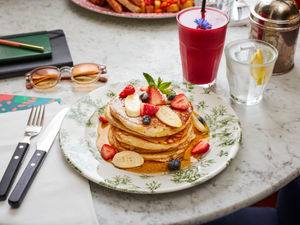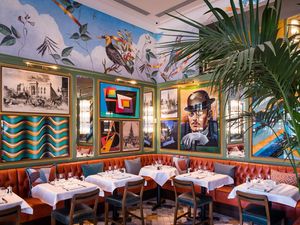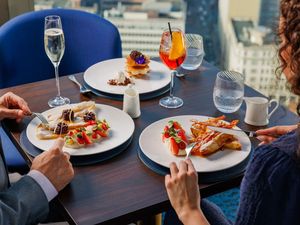How our empty restaurants are hanging on for dear life during coronavirus lockdown
With no idea when they can reopen, food could be off the menu for good at many of the places where we love to eat.
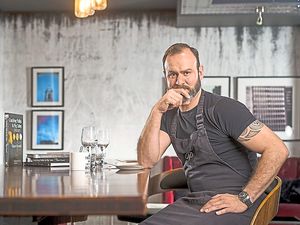
It’s not as though they were coining it in.
Most restaurants lead a hand-to-mouth existence with high staff costs and substantial overheads. Even before the Government lockdown, most were feeling the pinch.
The cost of power is high while ingredient costs fluctuate with the seasons. Trade is capricious and while successful venues enjoy good trade at weekends, they have to make up for dining rooms that are virtually empty from Monday to Wednesday.
When Boris Johnson took to the nation’s airwaves on March 17 and told people not to visit restaurants, all were aghast. How could the Prime Minister tell people not to visit restaurants without working out how to cover their costs?
It’s not as though the hospitality sector is one of smallest elements of the economy. It employs three million workers and generates £73 billion to the U.K. economy, making it country’s third largest industry.
With his announcement in March, Boris Johnson effectively shut the hospitality industry without any support, creating an avalanche of job losses and business failures.
Within a week, Chancellor Rishi Sunak had intervened, creating a furlough scheme to help save jobs.
For some, however, it was too late. A number of restaurants and bistros across the nation had already laid off staff. They’d been put into a position where they were paying wages, rent, utility bills and a range of other overheads while receiving no income. Losses were mounting, debts were piling ever higher.
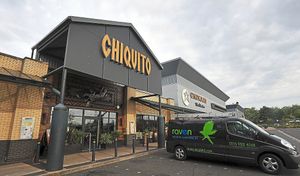
The impact hit hard, from the usually bustling Covent Garden in London to bistro pubs in rural Shropshire and Staffordshire. From small independent cafes to major chains like Chiquito and Carluccio’s, both of whom are now in danger of disappearing for good.
The hospitality industry is enormously important to the economy of the entire West Midland region. Twenty years ago, Shropshire earned itself a reputation for being the Gourmet Capital of Great Britain as Ludlow won three Michelin stars. And while those stars have long since gone, the county continues to have a buoyant restaurant sector.
The city that took Ludlow’s crown was Birmingham; a city with more Michelin stars than any UK town or city other than London. With five starred restaurants in the centre of the city, it is a centre of European importance with a burgeoning scene.
Suddenly, all of that came to an end.
Cedric Bosi, at The Charlton Arms, in Ludlow, said local restaurants were left high and dry. He said: “We couldn’t believe what we were hearing when the Government told people not to visit restaurants. They literally couldn’t have done anything worse. It meant they removed our income and left us with all the costs.”
Mr Bosi, who has a Michelin Bib Gourmand, denoting exceptional food at competitive prices, said: “Straight away, we had to think of ways to survive.”
Rishi Sunak’s furlough scheme provided some support. A Government-backed loan scheme was also intended to help, not that many found it particularly helpful.
Jonathan Greatorex, owner at The Hand at Llanarmon, near Oswestry, contacted his bank but found himself going round in circles. “The banks couldn’t have been less helpful. They basically tried to sell commercial products that generated substantial interest. But they also sought personal guarantees, rather than providing Government-backed loans.”
The furlough scheme and the loan scheme provided some assistance while not going far enough. Loans were troublesome at best, providing businesses with unsustainable levels of debt or forcing restaurateurs to put their own homes up as collateral against their business.
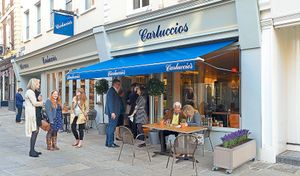
However, restaurants also faced other issues: ongoing costs.
Across Shropshire, Staffordshire, the Black Country and into Birmingham, very few restaurateurs own their premises. Many are rented on leases of varying duration, others are mortgaged. And so while furlough had removed the issue of the weekly wage bill, restauranteurs still needed to find a way to pay rent. There were also bills for utilities, loan payments on kitchens and more besides.
Celebrity TV chef Glynn Purnell, at the Michelin-starred Purnell’s, in Birmingham, said the challenge has been unprecedented.
He said: “There are huge ongoing costs for all restaurants, irrespective of staff. In normal circumstances, those payments are met through the revenues generated on food and drink – but all of that had stopped.”
Gradually, the Government will ease restrictions.
But the restaurant industry still faces it’s hardest challenges. Many have accumulated debt during the past two months and will continue to do so throughout the summer. They have missed such money-spinning events as Mother’s Day and most have savings that are either small or non-existent.
Cedric Bosi, in Ludlow, says it’s a tough road. “There were losses when we closed. Restaurants or pubs would have had food in the fridges and freezers, which was effectively written off. Some used that to cook for the community or to raise money for the NHS, all of which came out of their businesses as a cost.
“Others would have written off drink. The cost of beer in a lot of pubs will be absolutely frightening.
“But then when restaurants want to re-open, they’ve got to find another load of money to get going. They need to pay for produce, to pay for staff wages, they need to settle bills. But they’ve not been receiving any income at all, so who is to say where the re-start money comes from?”
Chris Burt has been back to the kitchens of the Mytton and Mermaid, in Shrewsbury, since being furloughed from his position as Executive Chef. He’s looking ahead with his owner so that the venue can recover.

They’ve mapped out new table arrangements, in the likely event that the Government insists on some form of physical distancing.
“Everything has changed. There are still a few people who imagine that it’ll all blow over and we’ll get back to normal. But normal ended. The business we knew before has gone. Our job is to come back stronger, to evolve, to work within the new rules and to remodel our business so that we can survive in a different environment.”
There will inevitably be fewer jobs. Many businesses will simply run out of cash and close.
The ones who survive will come back to fewer customers as consumer confidence is low. They will earn less and need less staff. There will be few winners, though a huge number will lose out.
Claire Bosi, in Ludlow, edits Chef and Restaurant Magazine, the UK’s surviving print magazine for chefs, restaurants and foodies.
While acknowledging the challenges ahead, she remains hopeful for the future. “The United Kingdom has one of the best restaurant and hospitality sectors in the world.
“We have brilliant chefs, fantastic front of house staff, amazing restaurants and sensational produce. All of the key ingredients are there. It’s going to take time but the best will survive.
"The one thing that restaurants need now more than ever is for the public to get behind them. Those that are operating takeaways need people to buy them so that they can afford to keep going.

"When chefs open their doors, they’ll need customers.”
Use them or lose them is the message moving forward. Our region has a hospitality sector that is the envy of the UK.
It caters to all budgets and all tastes, with cheap eats and gourmet dinners available in restaurants serving food from around the world. It won’t be long before some gradually start to re-open.
They face a fight for survival.
Devastating impact
Brad Carter, at the Michelin-starred Carter’s of Moseley in Birmingham, said restaurants lost trade overnight –and that the drip-down impact has been devastating.
“The industry came to a halt. It was like someone was driving a car and did an emergency stop,”he said.
He launched a regional hamper service, making deliveries across the Second City and into parts of the Black Country. It proved so successful that it was converted to a national service.

Brad added: “It’s not just the restaurants who are affected by this. If you think about some of our producers, they’re rearing animals over a period of many months so that they are ready at a particular time of year. So beef farmers or pork farmers would have animals ready to enter the food chain.
“But with closed restaurants, farmers had no one to sell their animals too. And without income from those sales, they didn’t have the money to pay for the feed to keep those animals. It was a catch-22. That’s why we felt our hampers were so important. We were providing a service for our customers, who loved them, we were helping the producers, by giving them trade and we were also generating our own small income.”
While some businesses are ticking over, the real uncertainty is when they might reopen properly.
A number of London’s top restaurateurs have already pushed back at the idea of reopening their venues while physical distancing measures designed to curb the spread of Coronavirus are in place.
Jeremy King of Corbin & King restaurant, said: “I am afraid I certainly have no interest in going to a place where I am sitting in isolation, surrounded by perspex screens. Where’s the fun in that?”
Alternative measures
Chefs were unsure what to do. Some sat at home, hoping for the best, posting vaguely amusing messages on social media without thinking about tomorrow. The sensible ones found ways to generate income so that they could at least cover their rent and ongoing costs, rather than racking up debts.
Suree Coates, the multi-award-winning Thai chef, based in Ironbridge, switched to a home-delivery or click-and-collect service. A slimmed down menu was offered on Thursdays, Fridays and Saturdays with her husband, Simon, acting as delivery driver and her son, Ross, taking orders and dealing with collections.
Suree said: “We had to do something. We did everything by the rules with anti-bac, hand gels, social distancing and safe deliveries. People were grateful that we made the effort to stay open.”
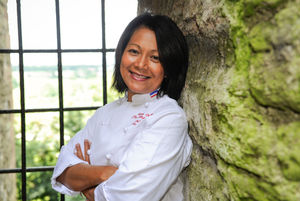
In Shrewsbury, such restaurants as House of the Rising Sun and Number Four were quick to innovate. Both switched to take-away, with Number Four also providing deliveries of such essentials as milk and bread.
Similar stories are true across the region. From Bridgnorth to Brownhills, from Willenhall to Wem; a number of restaurants looked to provide takeaway services to feed local communities and help themselves to stay afloat.
At the Hand at Llanarmon, head chef Grant Mullholland revised his usual menu. “We started cooking classics like burgers, fish and chips, lasagne, cottage pies. We cook to a two-AA-rosette standard normally, but we had to completely change our thinking so that we were providing comfort food for people to eat in their own homes. We started doing £10 dinners and they flew out.”
Such ventures suited some, though not all. Some of the region’s best restaurants, for instance, couldn’t find a way to provide home deliveries, re-imagine their menu or offer hamper services. Their lights went dark in March and will remain so for months.


